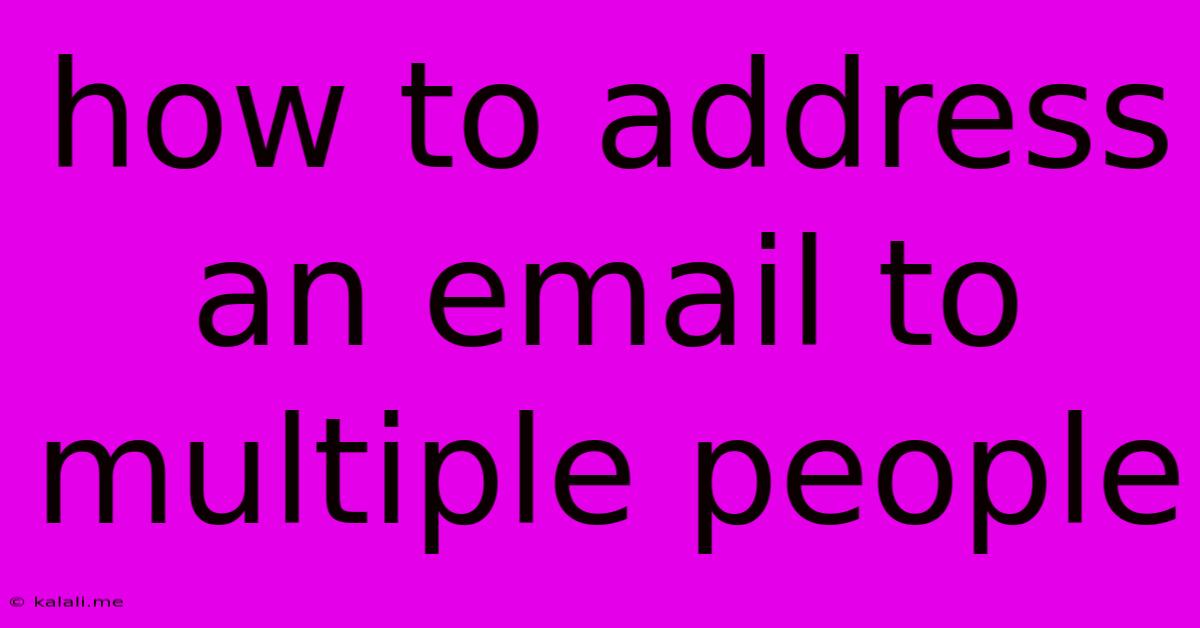How To Address An Email To Multiple People
Kalali
May 22, 2025 · 3 min read

Table of Contents
How to Address an Email to Multiple People: A Guide to Professional Etiquette and Efficient Communication
Addressing an email to multiple recipients requires a delicate balance between professionalism and efficiency. Getting it wrong can lead to confusion, miscommunication, and even offense. This guide provides a comprehensive approach to addressing emails with multiple recipients, covering various scenarios and offering best practices for clear and effective communication. This will help improve your email etiquette and ensure your message is received and understood correctly by everyone.
Knowing the appropriate way to address emails to multiple recipients is crucial for maintaining professional relationships and avoiding communication breakdowns. This guide covers everything from choosing the right salutation to managing replies and maintaining privacy.
Understanding the Different Email Addressing Methods
Before we delve into specific scenarios, it's crucial to understand the different ways you can address multiple recipients in an email:
-
To: This field is for the primary recipients, those who need to take action or require direct information from the email. Use this field judiciously, as recipients listed here can see all other recipients' email addresses.
-
Cc (Carbon Copy): Use this to keep people informed. Recipients listed in the "Cc" field receive a copy of the email, but they are not expected to respond. All recipients can see who else is copied.
-
Bcc (Blind Carbon Copy): Use this to send a copy of the email discreetly. Recipients in the "Bcc" field receive a copy, but their email addresses are hidden from other recipients. This is useful for privacy concerns or when sending a large number of emails.
Choosing the Right Salutation: A Personalized Approach vs. A Formal Greeting
The salutation you choose depends heavily on your relationship with the recipients and the context of the email.
Scenario 1: You know all recipients personally.
-
If the group is small and informal, you can use a group salutation like, "Hi team," or "Hello everyone."
-
For a slightly more formal approach, use "Dear [Name 1], [Name 2], and [Name 3]," This is suitable for colleagues you work closely with.
Scenario 2: You know some, but not all, recipients.
- In this case, a formal greeting is often the best choice. "Dear Team," or "Dear Colleagues," are suitable options. Avoid overly informal greetings unless you are certain all recipients will find them appropriate.
Scenario 3: You don't know any of the recipients personally.
- Sticking to a formal greeting like "Dear Sir/Madam," "To Whom It May Concern," or "Dear Hiring Manager" is the safest bet.
Addressing Emails in Different Professional Contexts
The best approach also changes based on the professional context:
-
Internal Emails: Within your company, you might use more informal greetings and address multiple colleagues using their first names. However, maintain a level of professionalism appropriate for your workplace culture.
-
External Emails: When emailing clients, potential employers, or other external contacts, maintaining a formal tone and using appropriate titles (Mr., Ms., Dr.) is important.
Managing Replies and Maintaining Privacy
-
Consider the "Reply All" function: Before replying, ask yourself if all recipients need to see your response. Unnecessary "Reply All" responses can clutter inboxes and waste time.
-
Use Bcc strategically: For large mailing lists or sensitive information, using the "Bcc" field protects recipient privacy. However, be aware that the sender's email address is still visible.
-
Respect confidentiality: Always be mindful of the information you are sharing and ensure your email communication aligns with your organization's data privacy policies.
Best Practices for Addressing Emails to Multiple People
- Keep it concise and clear: Get straight to the point. Your email should be easy to understand and act upon.
- Proofread carefully: Mistakes in your email can damage your credibility.
- Use a clear subject line: This helps recipients quickly understand the purpose of your email.
- Consider your audience: Tailor your language and tone to your recipients.
By following these guidelines, you can ensure your emails are professional, efficient, and effective, leaving a positive impression on all recipients. Mastering the art of addressing emails to multiple people is essential for clear communication in today's interconnected world.
Latest Posts
Latest Posts
-
How Do You Get Sticky Residue Off Wood
May 22, 2025
-
How Do You Reset Airbag Light
May 22, 2025
-
When Does One Piece Animation Change
May 22, 2025
-
Can You Make Dua On Your Period
May 22, 2025
-
Whats The Difference Between A Bar And A Pub
May 22, 2025
Related Post
Thank you for visiting our website which covers about How To Address An Email To Multiple People . We hope the information provided has been useful to you. Feel free to contact us if you have any questions or need further assistance. See you next time and don't miss to bookmark.